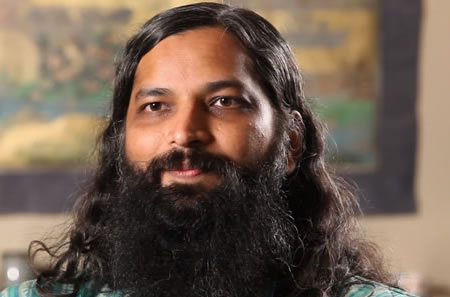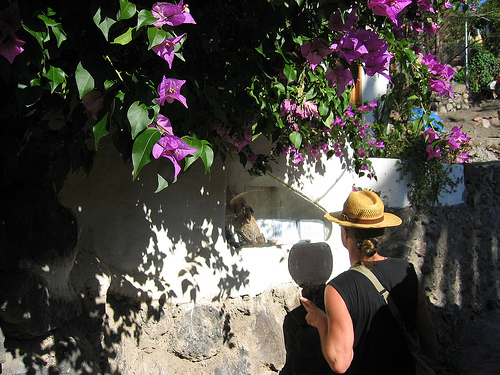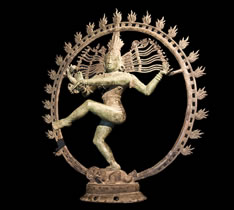„I am certain of nothing but the holiness of the heart’s affections and the truth of imagination. What the imagination seizes as beauty must be truth, whether it existed before or not.“ John Keats
„I am certain of nothing but the holiness of the heart’s affections and the truth of the imagination.“ English Romantic poet John Keats wrote that line in a letter to a friend over 200 years ago. It’s one of my favorite quotes of all time, as it has always resonated with my deeper of knowing truth. I share it now because I sense it conveys an important wisdom for our time.
Living from our heart expands us into more of who we really are. We more readily tap into our love, compassion and joy when we live from our heart. Joy is a key element in guiding us along our life path, in knowing what brings us alive, and in expressing ourselves creatively, so connecting with our heart helps with all that.

Sraddhalu Ranade, scientist and scholar at the Sri Aurobindo Ashram, possesses a deep belief in the universality of the experience of oneness. In this complete interview, Sraddhalu Ranade discusses obstacles to living the fullness of our being, the relevance of living our essential oneness in the world today, and the collective spiritual potential of humanity. „What is needed – and that’s the unity of the future – is a unity in which each one knows oneness with all, and yet is uniquely expressive of that oneness in an absolute freedom.“
Watch this wonderful video…
Read More →
No postures, contortions, exercises or routines – just relax, feel nice and easy with yourself. In that silence, sitting peacefully, all happens by itself, understanding arises of its own accord. When the moment is enough, there is no goal, no desire to be elsewhere, no turbulence.
Then energy has another dimension, the dimension of celebration in the moment.
How does one empty the mind? Not with effort, by watching. By becoming a witness. Watching passively, as one watches a river; not actively, as one waits for a lover. In this silence and ease, thoughts recede on their own, one’s mind becomes empty effortlessly. Tilopa
We have to create miracles. A miracle is not the intersession of an external divine agency in violation of the laws of physics. A miracle is simply something that is impossible from an old story, but possible from within a new one. It is an expansion of what is possible. – Charles Eisenstein
Recently I was camped in Yosemite Valley and in the middle of the day four deer came to the edge of my campsite and bedded down near where I was sitting. I had the intuition that they were there for me. Four is the number I associate with angels. Later in the day I listened to an animal communicator talk about deer representing the importance of being gentle with yourself. It was just the message I needed at that moment.
Read More →by Nishtha Müller
The inspired poetic Word was the means of passing on knowledge and experience by the Vedic Seers and by Sri Aurobindo, especially in his epic Savitri. What do the Vedic seers and Sri Aurobindo in their poetic creations themselves tell us about the Word, its nature and usage?
The central idea of this article is simply to make potential readers more conscious of the great value of mantric texts and point out a possible way to approach and use them. In regard to the Veda it must be said right from the outset that there exists the special barrier of the Sanskrit language in general and the multi-layer meaning of Vedic terms in particular. In addition there is the all-pervasive Vedic symbolism. Sri Aurobindo often calls the Vedic Rishis “symbologists“ and refers back to the period of the composition of the Vedic hymns both as the age of symbolism and the age of intuition. In fact Sri Aurobindo also makes much use of symbolism.
Let us begin now with some practical comparisons in regard to the transcendent origin of the Word as mentioned in the Veda and in Savitri. In Rig-Veda I.164 we read:
In the imperishable (place) of the illumining Word in the Transcendent Ether, all the Gods have taken their seat. Who does not know this (place), what can he do with the illumining Word (of the Veda)? But they, who know it, they sit here together in union. (39)
The radiant One has expressed herself in the forming of the flowing Waters. From one plane (of existence) she has manifested herself in two, in four, in eight, in nine planes. She is the imperishable with thousand (syllables) in the Transcendent Ether. (41)
From her flow out the oceans; by that live the four directions. From that moves the unmoving; by that lives the universe. (42)
In Savitri we find the following lines:
A glimpse was caught of things for ever unknown:
The letters stood out of the unmoving Word:
In the immutable nameless Origin
Was seen emerging as from fathomless seas
The trail of the Ideas that made the world …
(p. 40)

From all this we can deduct that on the transcendent plane or the superconscient we find an infinite potentiality of sound-forms, of which, in the context of human language, only a limited selection can be expressed through the organ of speech. Furthermore, in this context it is interesting to note that “akshara“ is, in the later tradition, not only one of the names for the sacred syllable OM, but also the general name for all syllables of the Sanskrit alphabet, perhaps so as to suggest that each of its sounds is still connected with its imperishable
origin, “the unmoving Word“. Then it is no surprise that in the Tantra all Sanskrit syllables
are called “Matrikas“, meaning little mothers.
Here are more lines from Savitri:
A Wisdom knows and guides the mysteried world;
A Truth-gaze shapes its beings and events;
A Word self-born upon creation‘s heights,
Voice of the Eternal in the temporal spheres,
Prophet of the seeings of the Absolute,
Sows the Idea‘s significance in Form
And from that seed the growths of Time arise.
(p. 271)
Above the parting of the roads of Time,
Above the Silence and its thousandfold Word,
In the immutable and inviolate Truth
For ever united and inseparable,
The radiant children of Eternity dwell
On the wide spirit height where all are one.
(p. 282)
Let us now look at three verses from a hymn to Agni, where we see how the Vedic seers seek after the higher planes of the Word. The translation is by Sri Aurobindo (in Hymns to the Mystic Fire).
To thee men illumined come with their thinkings for the conquest, to thee the imperishable One [comes] with her thousands. (VII.15.9)
Let him become the father of the Father in the womb of the Mother; let him break out into lightnings in the Imperishable, let him take his seat in the native home of the Truth.
O wide-seeing Fire, God who knowest all births that are, bring us the Word with its issue, the Word whose light shines in Heaven. (VI.16.35,36)

The different levels of the Word
With these last lines we come now to another most important aspect of the Divine Word, namely its manifestation on different levels of consciousness. The “imperishable One“ (akshara in fem. gender) means here the Divine Mother or Consciousness-Force (Cit-Shakti) in “the native home of the Truth“, which most likely relates to the transcendent and supramental level of the Word. In this context let us come to another quote from Rig-Veda I.164:
Read More →





